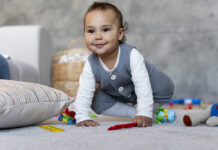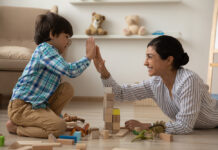Free Play is the type of play initiated by the child. It is unstructured and voluntary. This occurs when children start playing on their own, spontaneously. This kind of play includes Role Play (also called Pretend Play), outdoor activities, playing with dolls, blocks, moulding clay, crayons and paper – all this allows for fluid, creative playtime that is blissfully free of rules. Free Play has many supporters. Including the American Academy of Paediatrics. Their clinical report on The Importance of Play in Promoting Healthy Child Development and Maintaining Strong Parent-Child Bonds lays a great deal of emphasis on Free Play. Here’s how you can help your li’l baby bloom with Free Play:
Immobilise your mobile phone:

It’s not necessary that children must always play games that are structured or have a meaning. Their imagination starts expanding when they explore things by themselves. So let them fidget with loose pegs, overturn wicker baskets and discover odds and ends. But a word of advice: When you want to cook or do some work, please don’t give your baby a mobile phone or tablet to keep her busy. That’s how kids become addicted to gadgets. Instead give her some flour and water or some other items which will make her busy. And creative!
It’s all in the family:

Little masterchef. Race driver. Family doctor. Guitar player who plays along with Dad’s favourite rock songs. Teacher who teaches other teachers. Remember as a kid you must have played most of these characters and many more. In fact, your parents must have also been an integral part of your ‘chor police’ games, your topsy-turvy ‘umbrella houses’ and your instant classrooms. Now of course it is your baby’s turn to indulge in these role-play games.
Rock ‘n’ ‘Role’:

Role Play (also called Pretend Play) forms an important part of Free Play. Allow your child to act out situations. So young boys might act like cops and tough guys; little girls may act like their moms (and wear heels that are many sizes too big and look longingly at your lipstick and nail polish) and kids of both genders will probably imitate their favourite cartoon characters and superheroes. The thing to remember is that Pretend Play helps babies develop their personalities and pick up languages. Do remember though that sometimes Pretend Play can pose problems such as when your child wants to wear that nightie to play school. Solution: Be flexible but keep limits and make sure she plays safely.
In conclusion, Free Play helps babies to understand their own feelings, express their emotions, conquer their fears and practise adult roles. It helps them build their personal, social and emotional health. Free Play also helps babies and toddlers develop a sense of who they are and at the same time value the thoughts and feelings of others. Though Free Play may look very aimless, it opens up your child’s mind and in this day and age we all need a world ‘where the mind is without fear and where knowledge is free.’










